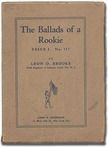Let me stay there for a while, while evening Gathers in the sky and daylight lingers on the hills. There's something in the air, something I can't quite see, Hiding behind this stock of images, this language Culled from all the poems I've ever loved. John Koethe's remarkable gift to readers is an elegiac poetry that explores the transitory nature of ordinary human experience. The beautiful poems in this new collection celebrate the creative power of human beings, the only weapon we possess against time's relentless "slow approach to anonymity and death." Of all Koethe's books, SALLY'S HAIR is probably his most human and various. He is well known for his meditative lyrics and this volume begins with a brilliant series of such poems, among them "Eros and the Everyday." This is followed by "The Unlasting," a long poem devoted to time and experience, and a third section comprised of more public poems, some of them political, such as "The Maquiladoras" and "Poetry and the War." This perceptive, luminescent collection concludes with a group of vivid and conversational poems, recollections, including the gems "Proust" and "HAMLET."
John Koethe (born December 25, 1945) is an American poet and essayist. Originally from San Diego, California, he was educated at Princeton University and Harvard University, and is currently a professor of philosophy at the University of Wisconsin–Milwaukee.[1]
With this discussion of age and time, the change from then to now, in the last few poems of the section, Koethe inevitable discusses the Iraq war and the pointlessness in its death and destruction. From "Poetry and the War": "Some wars are fantasies. The bombs and deaths are real,/Yet behind them lies an argument played out in someone's mind." It is clear where Koethe stands on this point, but it also fits in with the questions he is asking when one reaches middle age in our current time.
